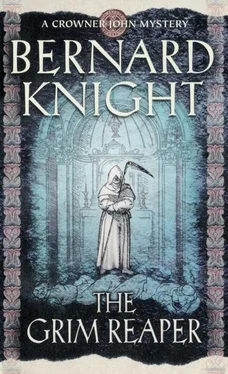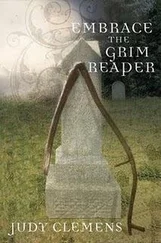Bernard Knight - The Grim Reaper
Здесь есть возможность читать онлайн «Bernard Knight - The Grim Reaper» весь текст электронной книги совершенно бесплатно (целиком полную версию без сокращений). В некоторых случаях можно слушать аудио, скачать через торрент в формате fb2 и присутствует краткое содержание. Год выпуска: 2002, ISBN: 2002, Издательство: Simon and Schuster, Жанр: Исторический детектив, на английском языке. Описание произведения, (предисловие) а так же отзывы посетителей доступны на портале библиотеки ЛибКат.
- Название:The Grim Reaper
- Автор:
- Издательство:Simon and Schuster
- Жанр:
- Год:2002
- ISBN:9780671029678
- Рейтинг книги:5 / 5. Голосов: 1
-
Избранное:Добавить в избранное
- Отзывы:
-
Ваша оценка:
- 100
- 1
- 2
- 3
- 4
- 5
The Grim Reaper: краткое содержание, описание и аннотация
Предлагаем к чтению аннотацию, описание, краткое содержание или предисловие (зависит от того, что написал сам автор книги «The Grim Reaper»). Если вы не нашли необходимую информацию о книге — напишите в комментариях, мы постараемся отыскать её.
The Grim Reaper — читать онлайн бесплатно полную книгу (весь текст) целиком
Ниже представлен текст книги, разбитый по страницам. Система сохранения места последней прочитанной страницы, позволяет с удобством читать онлайн бесплатно книгу «The Grim Reaper», без необходимости каждый раз заново искать на чём Вы остановились. Поставьте закладку, и сможете в любой момент перейти на страницу, на которой закончили чтение.
Интервал:
Закладка:
She shifted uneasily on the woollen blankets, as she also admitted to herself that the break from him had been an acknowledgement of the hopelessness of their affair. He was a Norman knight and the second most senior law officer in the county, married to the sister of the sheriff. Though the marriage was a hollow shell, there was no way in which it could be broken — and even if Matilda were to die, what king’s coroner would marry a lowly tavern-keeper?
Nesta tried to convince herself that she had ended the affair mainly for his sake, to rid him of the encumbrance of a common ale-house woman, but her heart told her that this was not true. She had been piqued that he had stayed away so much and for so long, and the sudden appearance of a good-looking young man, with his blandishments and flattery, had caught her at a vulnerable time.
Now she was regretting it deeply, especially as she had rejected John’s clumsy attempts at reconciliation when Alan had decamped with her money and her prettiest servant. Her pride had provoked her into sending the coroner away, with a bitter message about their future. He had not been near her since and the passing weeks had made any hope of mutual forgiveness fade to nothing.
She was still young, barely twenty-eight, and knew she was as attractive a widow as could be found anywhere in the city. Had she so wished, she could have found a decent man without difficulty — one who would marry her and help her run the inn, as her Meredydd had done when they first came to Exeter. But the zest had ebbed from her life and as she lay staring up at the dusty rafters, she wondered if she should sell up and go home to Gwent, back to her own people.
Her eyes filled with tears of despair and self-pity, but she brushed them away angrily as she heard the cathedral bell tolling. It was time to pull herself together and get down to her neglected business. Swinging herself from the couch, she looped up her long hair and crammed it into the linen helmet, then stepped into her long green kirtle before trying an ankle-length hessian apron around her waist. By the time she had laced her shoes around her ankles and climbed down the ladder, the table near the hearth was empty.
CHAPTER FOUR
The rest of the day passed peacefully enough for de Wolfe. While Matilda was praying at St Olave’s, he went up to the castle again and spent a couple of hours on his reading lessons, which had been neglected during the busy past weeks. An older vicar from the cathedral had been coaching him sporadically for months, though Thomas de Peyne had achieved far more with him while de Wolfe had been laid up with a broken leg at the beginning of the year.
Now the coroner was trying to regain lost ground by silently mouthing the simple Latin phrases from the parchments supplied by the priest. Then he moved on to writing, but found that his lack of practice had set him back almost to where he had begun. He could still manage his name slowly with a sliver of chalk on a thin sheet of slate, but his attempts to pen the alphabet and Roman numerals on a piece of scrap vellum ended in a mess of ink scratches and splatter.
Impatiently, he threw down the quill and rammed the stopper back into Thomas’s stone ink bottle. He stumped down the narrow spiral stairs to the guardroom below then went out into the city. He bought a hot pie from a booth at the bottom of Castle Hill and ate it between there and the Golden Hind, an inn on the high street near Martin’s Lane. Since he had virtually abandoned the Bush as his regular drinking place, this had become John’s local tavern and he stopped there for a pot of cider before going home to face Matilda’s frosty face over the supper table. The midday meal was the main one of the day, but Mary always set out some hot gruel, bread, cheese and cold meat in the evening, with a jug of red wine, and this was waiting when he arrived home.
The pie had taken the edge off de Wolfe’s appetite, but he sat down and ate a hunk of bread and a chicken leg to appease his wife, who was steadily working her way through everything on the table.
Depressed by his futile visit to the Bush, he studied his wife covertly from under his black eyebrows. What did the future hold for them, he wondered. Theirs had been a marriage of convenience and they had never been close, but as time had gone by, they had become more like two strangers lodging in the same house. His late father, Simon de Wolfe, who had two manors on Devon’s south coast, had thought it a good move to marry his second son into the de Revelle family, who owned far more land. Matilda was six years older than John, and her father was happy to unload his plain daughter on to a young Norman knight, who was making a name for himself as an enterprising soldier. The deal was struck with little concern for the wishes of bride or groom.
That had been sixteen years ago and de Wolfe had regretted it ever since. Until recently, he had deliberately spent almost all of his time away, at the French and Irish wars and latterly at the Third Crusade, where he had become part of the bodyguard of King Richard himself. Until three years ago his time at home with his wife could be reckoned in months, but the catastrophe of the Lionheart’s capture in Austria and long imprisonment had left John bereft of campaigns to fight.
Coming home, he had tried to settle down but boredom soon overcame him. He was comfortably off, due to his investment in Hugh de Relaga’s wool business and a share in the profits of his late father’s manors at Stoke-in-Teignhead and Holcombe, which were run by his elder brother William, but the tedium of this aimless life soon made him restless. Last year, he had even considered riding away again with Gwyn to find a war somewhere in France, preferably in the service of his king. Last autumn, though, a new opportunity had presented itself.
The huge ransom of a hundred and fifty thousand marks demanded by Henry of Germany for the release of Richard the Lionheart had thrown a massive burden on the Exchequer, added to by the King’s constant demands for money to support his war against Philip of France. The task of raising these sums had fallen on the Chief Justiciar, Hubert Walter, who was now virtually Regent of England. Hubert had been the King’s military deputy in the Holy Land and knew John de Wolfe well. The previous September, in a scheme to raise money, Hubert had re-established in every county the ancient Saxon office of coroner and had warmly supported de Wolfe’s bid for one of the Devonshire vacancies.
In truth, de Wolfe himself had not been all that keen at first, but Matilda — as devoted to social climbing as she was to religion — had been adamant that he should grasp this chance to become a respected figure in the county hierarchy. As one of Hubert’s objects in establishing coroners was for them to restrain the corruption of sheriffs, her brother was opposed to the whole idea, but Matilda had persuaded him that having his brother-in-law as coroner would be preferable to some more interfering stranger. Unfortunately for Richard de Revelle, the opposite turned out to be the case and ever since his appointment nine months earlier, de Wolfe had been a constant thorn in his side. His unswerving loyalty to his king and his refusal to indulge in the graft and embezzlement that was virtually a way of life to most senior officials, kept him endlessly in conflict with de Revelle.
All this marched again through John’s mind as he watched Matilda finish her meal. She was a heavily built woman, with a short neck and a square face. Her small eyes had a slightly oriental look and the heavy pouches under them and the deep lines running down from her mouth gave her a permanently disgruntled expression. Matilda must have sensed his prolonged survey, for suddenly she looked up and glared at him. ‘Are you any further with your latest murder?’ she demanded.
Читать дальшеИнтервал:
Закладка:
Похожие книги на «The Grim Reaper»
Представляем Вашему вниманию похожие книги на «The Grim Reaper» списком для выбора. Мы отобрали схожую по названию и смыслу литературу в надежде предоставить читателям больше вариантов отыскать новые, интересные, ещё непрочитанные произведения.
Обсуждение, отзывы о книге «The Grim Reaper» и просто собственные мнения читателей. Оставьте ваши комментарии, напишите, что Вы думаете о произведении, его смысле или главных героях. Укажите что конкретно понравилось, а что нет, и почему Вы так считаете.












